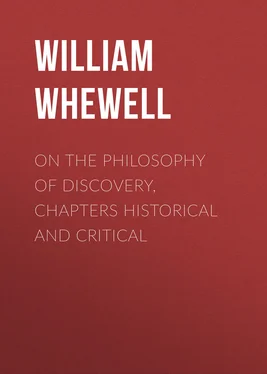It has been said 187 187 Ib.
that the key of the Baconian doctrine consists in two words, Utility and Progress. With regard to the latter point, we have already seen that the hope and prospect of a boundless progress in human knowledge had sprung up in men's minds, even in the early times of imperial Rome; and were most emphatically expressed by that very Seneca who disdained to reckon the worth of knowledge by its value in food and clothing. And when we say that Utility was the great business of Bacon's philosophy, we forget one-half of his characteristic phrase: "Ascendendo ad aximomata," no less than "descendendo ad opera," was, he repeatedly declared, the scheme of his path. He constantly spoke, we are told by his secretary 188 188 Pref. to the Nat. Hist. i. 243.
, of two kinds of experiments, experimenta fructifera , and experimenta lucifera .
Again; when we are told by modern writers that Bacon merely recommended such induction as all men instinctively practise, we ought to recollect his own earnest and incessant declarations to the contrary. The induction hitherto practised is, he says, of no use for obtaining solid science. There are two ways 189 189 Nov. Org. lib. i. Aph. 19.
, "hæc via in usu est," "altera vera, sed intentata." Men have constantly been employed in anticipation ; in illicit induction. The intellect left to itself rushes on in this road 190 190 Ibid. lib. i. Aph. 20.
; the conclusions so obtained are persuasive 191 191 Aph. 27.
; far more persuasive than inductions made with due caution 192 192 Ib. 28.
. But still this method must be rejected if we would obtain true knowledge. We shall then at length have ground of good hope for science when we proceed in another manner 193 193 Aph. 104. So Aph. 105. "In constituendo axiomate forma inductionis alia quam adhuc in usu fuit excogitanda est," &c.
. We must rise, not by a leap, but by small steps, by successive advances, by a gradation of ascents, trying our facts, and clearing our notions at every interval. The scheme of true philosophy, according to Bacon, is not obvious and simple, but long and technical, requiring constant care and self-denial to follow it. And we have seen that, in this opinion, his judgment is confirmed by the past history and present condition of science.
Конец ознакомительного фрагмента.
Текст предоставлен ООО «ЛитРес».
Прочитайте эту книгу целиком, купив полную легальную версию на ЛитРес.
Безопасно оплатить книгу можно банковской картой Visa, MasterCard, Maestro, со счета мобильного телефона, с платежного терминала, в салоне МТС или Связной, через PayPal, WebMoney, Яндекс.Деньги, QIWI Кошелек, бонусными картами или другим удобным Вам способом.
Metaph. xii. 4.
Diog. Laert. Vit. Plat.
T. ii. p. 16, c, d. ed. Bekker, t. v. p. 437.
See the remarks on this phrase in the next chapter.
Hist. Ind. Sc. b. iii. c. ii.
This matter is further discussed in the Appendix, Essay A.
These matters are further discussed in the Appendix, Essay B.
See Appendix, Essay B.
Hist. Ind. Sc. b. ii. Additions to 3rd Ed.
See these views further discussed in the Appendix, Essay C.
Metaph. xii. 4.
Hist. Ind. Sc. b. i. c. iii. sect. 2.
Analyt. Prior. i. 30.
Analyt. Post. i. 18.
Analyt. Prior. ii. 23, περι της επαγωγης.
Analyt. Post. ii. 19.
But the best reading seems to be not ἔν τι but ἔτι: and the clause must be rendered "both to perceive and to retain the perception in the mind." This correction does not disturb the general sense of the passage, that the first principles of science are obtained by finding the One in the Many.
Analyt. Post. i. 34.
Ibid. ii. 19.
Analyt. Prior. ii. 25.
See on this subject Appendix, Essay D.
See the chapter on Certain Characteristics of Scientific Induction in the Phil. Ind. Sc. or in the Nov. Org. Renov.
Phil. Ind. Sc. b. viii. c. i. art. 11, or Hist. Sc. Id. b. viii.
B. i. c. xi. sect. 2.
B. iii. c. i. sect. 9.
De Cælo , ii. 13.
Ibid. ii. 10.
xii. 8.
B. xvi. c. vi.
On the Classification of Mammalia, &c.: a Lecture delivered at Cambridge , May 10, 1859, p. 3.
B. i. c. xi.
History of Scientific Ideas , and Novum Organum Renovatum .
The remainder of this chapter is new in the present edition.
Hist. of Greece , Part ii. chap. 68.
De Antiqua Medicina , c. 20.
Lib. i. c. 9.
De Elem. i. 6.
In former editions I have not done justice to this passage.
Hist. Ind. Sc. Addition to Introduction in Third Edition.
Lib. i. Fast.
Hist. Nat. i. 75.
Quæst. Nat. vii. 25.
Quæst. Nat. vii. 30, 31.
Ibid. iii. 7.
Hist. Ind. Sc. b. iii. c. iv. sect. 8.
Ibid. b. ix. c. ii.
See Hist. Ind. Sc. b. iv. c. i.
See the opinion of Aquinas, in Degerando, Hist. Com. des Syst. iv. 499; of Duns Scotus, ibid. iv. 523.
Liber Excerptionum , Lib. i. c. i.
Tr. Ex. Lib. i. c. vii.
Tenneman, viii. 461.
Mores Catholici, or Ages of Faith , viii. p. 247.
Tenneman, viii. 460.
Читать дальше












